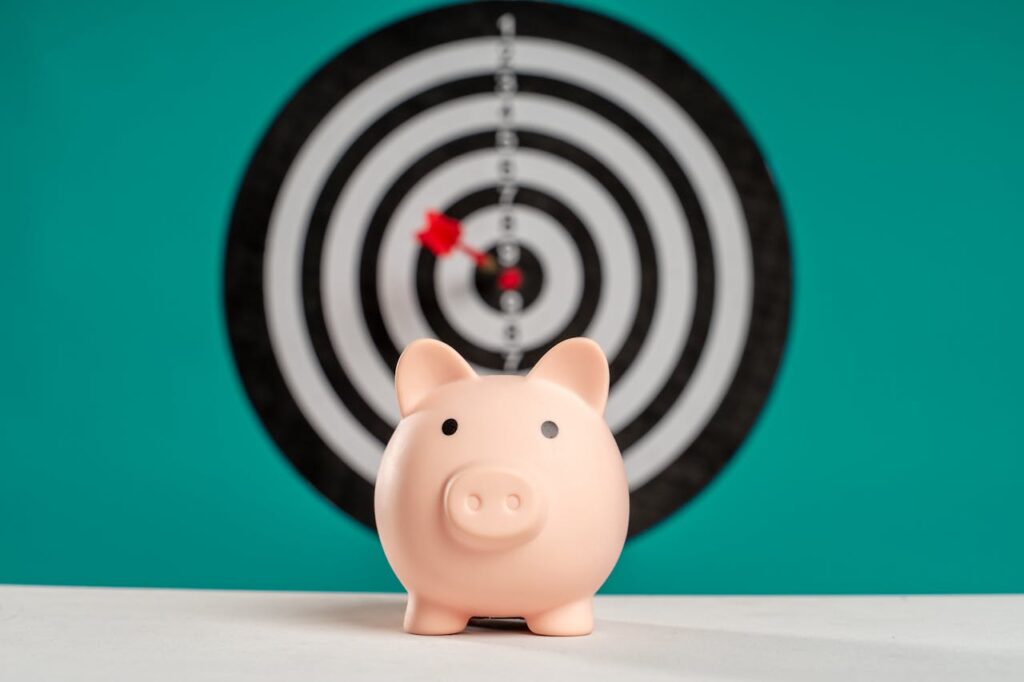Wondering where your hard-earned cash goes every month?
You’re not alone.
A recent survey found that 78% of Americans live paycheck to paycheck.
But with the right mindset, spending money wisely will become second nature and result in financial stability.
This post will explore the mindset shifts and spending habits you need to master your money.
Here’s what I’ll cover:
- A pain-free way to create a budget
- Setting and achieving financial goals
- How to get more from your money
- And much more
By the end of the post, you will have more clarity and confidence, so you can spend smarter and save more.
Let’s dive in.
1. Create a Budget
Creating and sticking to a budget is an essential first step when spending money wisely.

Are you unsure where your money goes every month? Do your expenses sometimes exceed your income?
Without a clear financial plan, you can’t see where you might be overspending, which will stop you from achieving financial security.
When you know exactly where every dollar is going, you gain back control, plan for a better future, and minimize stress.
To get started, I’ve laid out some steps from the popular book You Need a Budget by Jesse Mecham.
There’s also an app that I highly recommend. Check out YNAB here for a free 34-day trial to get your budget dialed in.
- Give every dollar a job. This step involves allocating your money to your expenses so that you know you aren’t falling behind. You can use a simple Google Sheet template or the YNAB tool which these steps originate from.
- Embrace your true expenses. Don’t forget those bills that creep up throughout the year. Total these non-monthly expenses up into smaller monthly payments.
- Roll with the punches. This step allows you to be flexible and adjust your budget throughout the month when necessary. If you overspend in one category, reallocating funds will help you stay on track and move you closer to your saving goals.
- Age your money. Lastly, this one breaks the paycheck-to-paycheck cycle. It’s about building a buffer to pay bills from the money you earned at least 30 days ago. More on buffers and emergency funds later.
When you follow a system like this, budgeting no longer feels limiting but helps you achieve financial freedom.
2. Set Money Goals
When you start spending money wisely, it may feel like you’re saying goodbye to your dreams for good.


However, setting short- and long-term goals can be an immediate call to action to secure a better future for yourself.
That’s because your future starts with your choices today, and having clear targets helps you prioritize your spending.
Start by making a list of your short and long-term goals.
Short-term goals include paying off debt, emergency funds, vacations, and leisure activities.
Long-term goals include things like homeownership, strategic investing, and retirement savings.
Next, you’ll want to prioritize your goals and set realistic timelines for each. Estimate how much you’ll need to save each month to make these goals a reality and add them to your monthly budget.
Defining your financial goals regularly and reminding yourself of them provides direction and motivation to manage your money more effectively.
3. Prioritize Needs Over Wants
Another essential tip for spending money wisely is prioritizing your needs over your wants.
The idea stems from ancient Stoic philosophy, which emphasizes the importance of knowing what is absolutely necessary for a good life (needs) versus what is desirable (wants).
Personal finance experts and budgeting frameworks support this idea when managing money.
A great place to start is with the 50/30/20 rule, popularized by Senator Elizabeth Warren. Under this rule, you allocate 50% of after-tax income to needs, 30% to wants, and 20% to savings and debt repayments.
Establishing this practice creates self-awareness of what you truly want in life while prioritizing your needs.
4. Build an Emergency Fund
An unexpected expense like a car repair or medical bill can force you into debt without an emergency fund, leading to more money worries.


In his book, The Total Money Makeover, Dave Ramsey recommends a starter emergency fund of $1,000 if you have debt.
Once your debt repayment has ended, he suggests saving for a fully funded emergency fund. This fund covers 3-6 months’ worth of living expenses.
This will safeguard you against a large expense or even being laid off from your job while you find something else.
You can start small by saving $20 a week and reach your starter emergency fund in under 1 year.
Already got savings? Check out our post on what to do with extra money for smart spending tips.
5. Use Credit Wisely
Now, if you’ve read anything by Dave Ramsey, you’ll know he’s against credit cards. His philosophy is that using cash improves financial discipline and builds responsible spending habits.
This is all sound advice that the majority of us should probably follow.
However, using credit can have a few benefits if you pay off the full balance every time.
- Using a credit card can improve your credit score by displaying responsible use in your credit history.
- Many credit cards offer rewards such as air miles and free upgrades.
- Most credit cards come with fraud liability protection and purchase protection.
Just check out what the man behind the ‘Catch Me If You Can’ story (book and movie), Frank Abignale Jr., had to say about credit cards vs debit cards at his Talk at Google.
In short, it can help you mitigate risk. And you can make credit work in your favor with responsible use and diligent management.
6. Practice Delayed Gratification
Seen a new gadget you’re dying to get your hands on?
Try waiting 48 hours before you buy. Quite often, the impulse to buy ‘shiny new things’ is easier to stop than you might think.


Delayed gratification (or impulse control) is one of the best things you can do for your savings account and your overall wellbeing in life.
For a rapid mindset shift, check out this video on the marshmallow test and how delaying impacts your success:
“The ability to delay gratification is a master skill of wealth building.” – Brian Tracy
7. Shop Around
Another way to spend money wisely is to always compare prices.
In almost every situation, you can find the same product at a lower price from a different retailer.
A great tip is to do a quick search online if you’re looking at a product in-store. Even if it’s a dollar cheaper and you can wait a few days for delivery, you can save yourself a lot throughout the year.
Another way to “shop around” is to use price comparison websites. This is highly recommended when shopping for things like insurance or a new mobile phone contract.
Even if it means buying a different brand or using a different service, the cheaper option might be good enough.
8. Take Advantage of Discounts and Rewards
The next tip for getting smart with your money is to always look out for discounts or rewards.


Similar to shopping around for lower prices, this one involves checking for coupons for things you need to buy.
Whether you find a coupon for a local store or discount codes for online purchases, forming this spending habit can result in significant savings.
A great way to find these discounts online is to use the browser extension Honey or get cash back with Rakuten’s Cash Back Button.
9. Track and Review Spending Regularly
Here’s a big one if you seriously want to transform your relationship with money.
Regular tracking can help you become aware of your spending habits and reestablish your goals before things get out of hand.
It can also help you find patterns and opportunities to save, bringing you closer to financial wellness.
Think of this as an act of self-respect. When you track and review spending every month, you’re saying that you’re worth the effort of taking control of your financial future.
Again, I highly recommend the book You Need a Budget or better still the YNAB tool to make this process a breeze.
10. Embrace Essentialism
Similar to the concept of prioritizing your needs, essentialism goes a little deeper.


In his book Essentialism, Greg McKeown advocates for a discipline that focuses on the absolute essentials and eliminating everything else.
This approach to life can support your savings goal and effective money management by only investing in what aligns with your highest values.
This quote from the book sums this concept up perfectly:
“If you don’t prioritize your life, someone else will.” – Greg McKeown
11. Invest for Long Term
If you follow the tips on this page and further your knowledge with any of the books mentioned, a natural next step is to start investing your money.
When you invest for the long term, you build your wealth and secure your future (and potentially your family’s future as well). If you can afford even a small amount each month, the benefits are worth it in the long run.
However, it’s vital to do your research before you start investing. Whether in a 401(k), index fund, mutual fund, or individual stocks, educating yourself is the best investment you can make.
If you want to learn more, The Intelligent Investor by Benjamin Graham is often referred to as the greatest investing book of all time.
You can check out a summary here:
12. Learn From the Best
The fact you’re reading this post means you’re already taking charge of your money situation.
But articles on the internet are just the beginning. You need to educate yourself from the experts in the field of money management and personal finance.
Here’s a quick recap of books and resources to further your learning:
“It’s good to learn from your mistakes. It’s better to learn from other people’s mistakes.” – Warren Buffett.
Spending Money Wisely in Conclusion
To start spending money wisely, you first need to educate yourself. These tips are an excellent place to start.
Real success is achieved when these tips become a habit. Write them down and practice them every day, and you’ll start seeing significant changes.
And remember that you can get a free 34-day trial to YNAB – trust me – it’s a fantastic tool that I’ve personally used and recommend to friends to create a budget.
